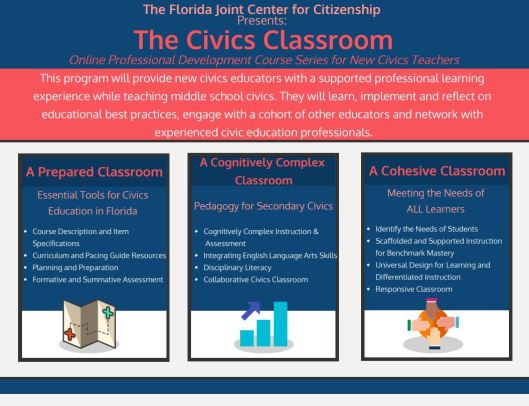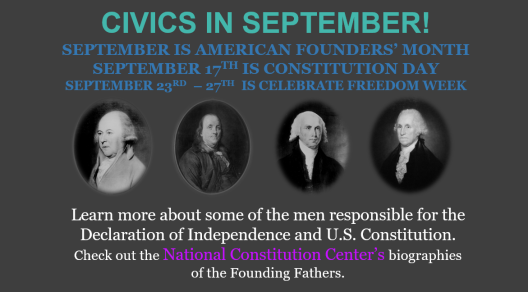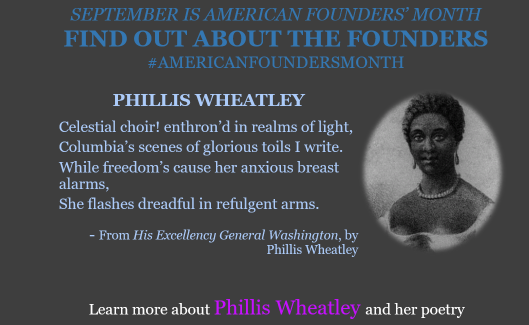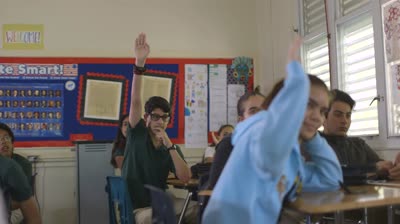
Friends in Civics, we have some exciting news. The Florida Joint Center for Citizenship at the Lou Frey Institute is now offering a free online Canvas course targeting primarily new and beginning civics teachers in Florida, though it is open to any and all civics educators who are interested.
This program will provide educators new to civics with a supported professional
learning experience while teaching middle school civics. They will learn,
implement and reflect on educational best practices, engage with a cohort of
other educators and network with experienced civic education professionals. You can learn more about the course series here!
For those teachers in Florida seeking points towards certificate renewal, this course series offers that opportunity through the ePDC (electronic Professional Development Connections) system. In the infographic below, you can see the scope and sequence of the course series.

“I just wanted to thank you for offering the online Civics Modules, I learned so much during the first one and can’t wait to implement some of the things I learned.” —A beginning civics teacher “Thank-you also for the course- I learned quite a bit about how to teach Civics in Florida and to especially to 7th graders.” —An experienced teacher new to civics in Florida
In September, we will be starting the next cohort for COURSE ONE: A Prepared Classroom, and enrollment for that is open as of August 09, 2019. For those that finished Course One previously, Course Two will begin enrolling at the end of August!
A Prepared Classroom will focus on understanding the role of course descriptions and the Civics End-of-Course Test Item Specifications, utilizing curriculum and pacing guide resources, strategically planning and preparing for instruction, as well as providing data informed instruction based on formative and summative data. You can view the syllabus for the first course here: FJCC A Prepared Classroom Syllabus
Are you more interested in the second or third courses because you feel pretty good about the content in the first one? That is fine! You DO NOT have to take every course; Florida teachers may earn renewal points for EACH course in the series. We will be launching the second course, A Cognitively Complex Classroom, in mid-September!
Each course in the series will be offered through the free version of the Canvas platform. Canvas Free for Teacher accounts are always free, but they do not contain all features available to institutional users of Canvas. For example, no client support beyond access to the Canvas Guides is offered to you as a Free for Teachers user. With a Canvas Free for Teachers account users can access and participate in courses as well as create (and host) their own online courses. Please note that you WILL have to create a new account to use this version of the platform; it is not compatible with the institutional version you may use in your school or district. You can learn more about this version of the platform here.
In order to enroll FOR RENEWAL CREDIT in the course, you will need to be sure that you register through the ePDC system. Let’s walk through the process together. First, go to the PAEC website at PAEC.org.

Once there, click on ePDC and if this is your first time, click on ePDC and then ‘Create an Account.’ Once you confirm your account registration, sign in and then click again on ePDC and select ‘Course Offerings’. You should see a screen like this:

Click on ‘Course Offerings’, and you will see something like this:

In the ‘Search Text’ bar, you can type ‘FJCC’, and the course should appear! BE SURE TO ENROLL IN THE SEPTEMBER 2019 Fall Cohort Course. Course One is ‘The Prepared Classroom’
Click on ‘Register’ and you should be in. The ePDC course is setup to automatically direct the person that registers for the course to the Canvas Course page. You will have to create an account if you do not already have one but the link to the September course is embedded in the ePDC PAEC course.
You can expect a follow up email or two from your course instructor in late August and early September, prior to the start of the course. At this time, registration is limited to the first 25 participants, but it may be possible to make exceptions!
How are in-service points handled?
PAEC extracts in-service records from the ePDC and submits in-service data for member and participating districts to the Florida Department of Education as a service to districts. Teachers from outside of PAEC member or participating districts should print the Certificate of Completion for each course and submit the certificate to the appropriate district professional development office.
We do hope to see you in this online space for learning and the development of a virtual professional learning community. Please share this with anyone you believe might benefit from this course series!
Questions about this entire course series, or the first course in the series (‘A Prepared Classroom‘), can be directed to Dr. Steve Masyada.























